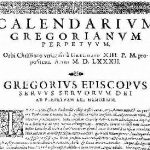A client once asked me how it is that the tax year ends on such an odd date. It just so happens that I knew the answer and it is interesting enough to share. But it is a long story, here goes:
Once upon a time our calendar year started during March. This ‘Roman’ year started at the Vernal Equinox: the day in Spring when darkness and light are of equal length. However the Lunar calendar (on which this was based) is not the same length as the Solar Calendar so the calendar needed regular adjusting.
 With wars and civil disturbances these adjustments didn’t get made for a few years, so much so that when Julius Caesar returned home to Rome in 46BC the diary was two months out of kilter! To adjust this he did two things: he introduced two ‘leap months’ that year, catching up 7 days, and he switched to the Solar calendar, which lasted 365 days. He then only had to add one leap year of an extra day every four years, to keep the calendar in alignment (which we still do of course).
With wars and civil disturbances these adjustments didn’t get made for a few years, so much so that when Julius Caesar returned home to Rome in 46BC the diary was two months out of kilter! To adjust this he did two things: he introduced two ‘leap months’ that year, catching up 7 days, and he switched to the Solar calendar, which lasted 365 days. He then only had to add one leap year of an extra day every four years, to keep the calendar in alignment (which we still do of course).
He also did something radical: he decreed that the next year should start on 1 January (instead of during March). In case you wondered, that is why the months of Sept, Oct, Nov & Dec are no longer the months after which they were named (the seventh and eighth month etc). To honour him they renamed the fifth month (then Quintilius) as Julias, and we now know it as July.
However 700 years later the Christians made a change, they wanted New Year’s day to be the 25th December, the anniversary of Christ’s birth. That lasted a few hundred years until some religious dissidents decided the New Year should be 25th March – the presumed anniversary of Christ’s conception.
However Caesars calculations had also proved slightly wrong and in 1582 the Pope decided that 10 days should be omitted from the calendar and the 5th October became the 15th October and he also switched the New Year back to 1 January!
 Most of Europe fell into line with this ‘Gregorian’ Calendar except Britain, as the Protestant Elizabeth insisted on sticking to the Julian Calendar. Alignment came however in 1752 – which meant that 1751 comprised of only 282 days. Another adjustment was necessary in September when 2nd September had to be followed by 14th September.
Most of Europe fell into line with this ‘Gregorian’ Calendar except Britain, as the Protestant Elizabeth insisted on sticking to the Julian Calendar. Alignment came however in 1752 – which meant that 1751 comprised of only 282 days. Another adjustment was necessary in September when 2nd September had to be followed by 14th September.
On this occasion simple folk thought that 11 days has been ‘stolen’ from them, leading to ‘give us back our 11 days’ riots which had many fatalities.
Educated people however were more worried about the fact that they had 11 days less to earn money to pay the full year of tax that the Government would still claim.
As ever it was the bankers that had the clout – they organised a tax strike and argued that they should be allowed a one-off extra 11 days to pay their tax, moving the tax year-end to 5th April.
Most European countries use the Calendar year to collect their tax. However since 1752 we’ve used the 5th April – and now you know why!
And you thought changing the clocks was disruptive. How would it be if the current Chancellor saw an opportunity for an adjustment to swell the coffers? How would you feel about losing two weeks instead of an hours sleep?
